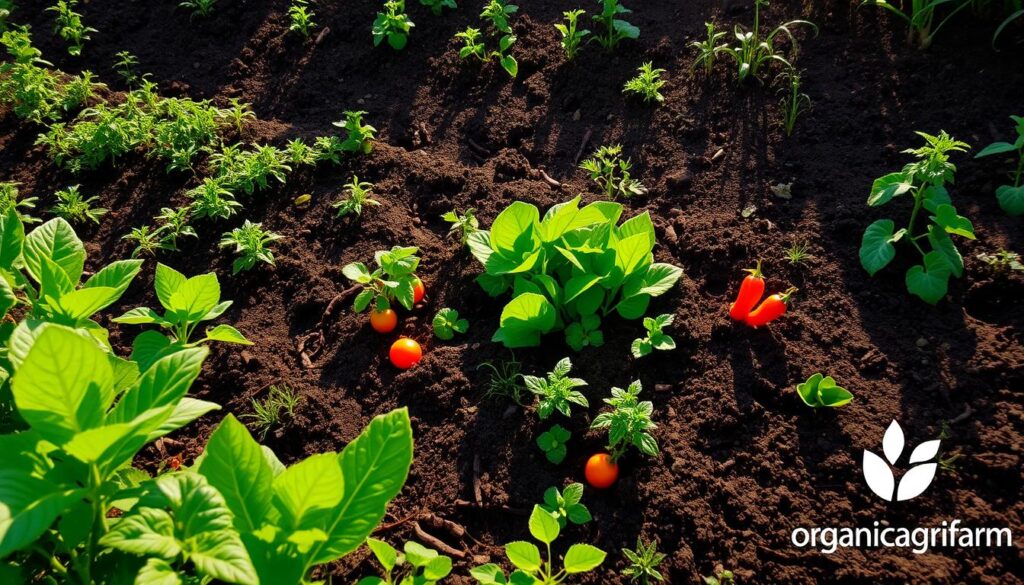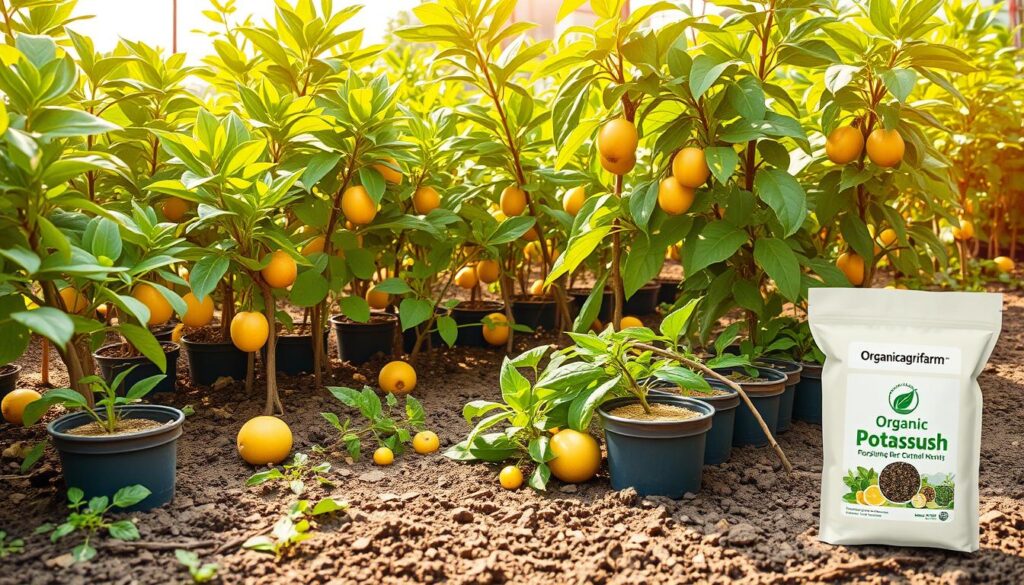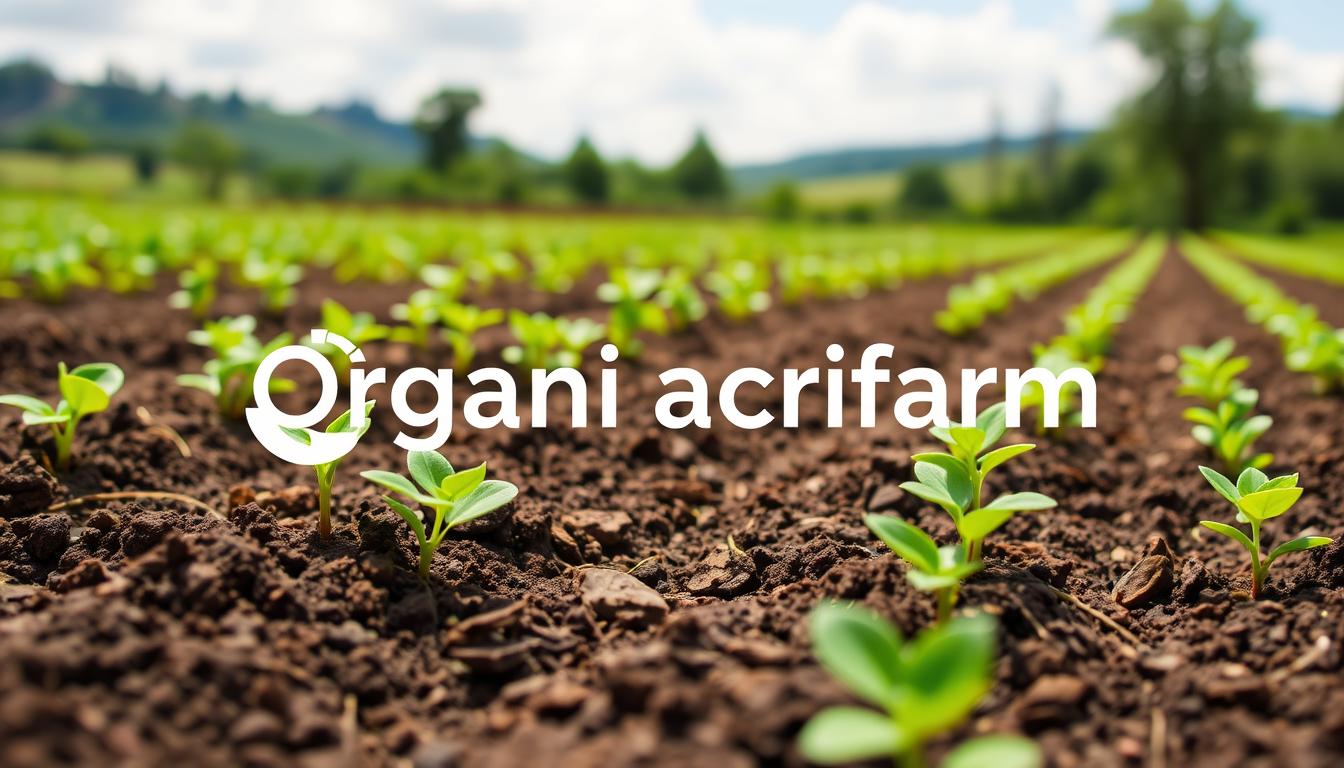Worldwide, 70% of crops depend on organic potash fertilizer to grow. India is a big user of this. Organic potash fertiliser boosts crop yields and plant health. It helps farmers enrich soil naturally, reducing harm to the environment.
Organic potash fertiliser, like Katyayani, is great for crops like corn and vegetables. It increases both the amount and quality of crops. It also makes plants healthier, better at holding water, and more resistant to diseases.
It gives plants the nutrients they need for growth. This reduces the need for harmful synthetic fertilizers, making farming better for the planet.
Understanding Organic Potash Fertiliser and Its Importance
Organic potash fertiliser is key for making soil better. It gives plants the nutrients they need to grow. With the world’s population set to grow by 35% in 40 years, we need more potash than ever.
Organic farming supplies, like potash fertilisers, keep soil healthy. They help crops grow well. This is important for feeding everyone.
Potash is vital for farming. Over 90% of it goes to feed crops. Organic potash helps plants grow better, yields more, and fights off stress. It’s a better choice than synthetic fertilisers for the soil.
What Makes Potash Essential for Plant Growth
Potash helps plants grow by improving photosynthesis and water balance. It also helps with nitrogen and activates enzymes. Without enough potassium, plants suffer.

The Difference Between Organic and Synthetic Potash Fertiliser
Organic potash comes from nature, like manures and plant parts. Synthetic potash is made in labs. Choosing organic helps the soil and the planet.
| Type of Potash Fertiliser | Composition | Benefits |
|---|---|---|
| Organic Potash Fertiliser | Natural sources, such as manures and plant residues | Promotes sustainable soil enrichment, reduces environmental impact |
| Synthetic Potash Fertiliser | Chemical processes | Quick fixes, but can harm soil health and the environment |
Traditional Potash Sources in Indian Agriculture
Indian farming has always used organic gardening products and potassium-rich plant food. This helps improve soil fertility and supports sustainable farming. Natural potassium sources like compost and green manure have been used for centuries. They contain potassium, but less than synthetic fertilizers.
Traditional potash sources include wood ash, bone meal, and seaweed. These are not only rich in potassium but also in other essential nutrients. For instance, wood ash adds calcium, magnesium, and sulfur. Bone meal is a good source of phosphorus and nitrogen.

Indian farmers also use modern organic gardening products. These include potassium-rich fertilizers made from natural ingredients like plant extracts and microbial cultures. These products slowly release potassium, helping plants grow well and protecting the soil.
The benefits of using these traditional and modern organic products are many. They include:
- Improved soil fertility and structure
- Increased crop yields and quality
- Reduced soil erosion and environmental pollution
- Enhanced biodiversity and ecosystem services
Using traditional potash sources and organic gardening products is key to sustainable agriculture in India. It promotes healthy soils, plants, and environments.
Case Study: Implementation at Maharashtra Organic Farm
At Maharashtra Organic Farm, they chose an eco-friendly fertilizer to boost soil health and grow more crops. They picked an all-natural potassium fertilizer, a key part of organic farming. This choice helped reduce the farm’s environmental impact and support sustainable farming.
The farm faced tough soil conditions, with low potassium and poor structure. To fix this, they created a detailed soil management plan. This plan included using organic potash fertilizers. The outcome was amazing, with big improvements in soil health and crop yields.
Using all-natural potassium fertilizers brought many benefits to the farm. These include:
- Improved soil structure and fertility
- Increased crop yields and quality
- Reduced environmental pollution and soil degradation
- Enhanced biodiversity and ecosystem services
The farm’s story shows how eco-friendly fertilizers, like all-natural potassium, help in sustainable farming. They improve soil health too.
| Soil Parameter | Before Implementation | After Implementation |
|---|---|---|
| Potassium Levels | Low | Optimal |
| Soil Structure | Poor | Improved |
| Crop Yields | Low | Increased |
Environmental Benefits of Natural Potash Sources
Using organic potash fertiliser and natural potassium fertilizer is good for the environment. They help plants hold more water and resist drought. This makes farming less harmful to the planet.
The International Potash Institute (IPI) says these fertilizers can make farming more efficient. They can cut down on greenhouse gas emissions by 20%. This is because they help plants use nitrogen better.
Also, natural potassium sources lower the carbon footprint of farming. ICL, a big fertilizer maker, makes potash fertilizers in a green way. Their Dead Sea site produces top-notch fertilizers that help farmers grow more food.
Water Conservation Impact
Organic potash fertiliser and natural potassium fertilizer save water. They make soil better at holding water. This means farmers use less water and spend less on irrigation.
Some key benefits include:
- Improved drought resistance
- Increased water retention
- Reduced irrigation costs
- Decreased water usage
Carbon Footprint Reduction
Natural potassium sources also cut down on carbon emissions. By using them, farmers can reduce their greenhouse gas output. This helps make farming more sustainable.
The advantages are:
- Reduced greenhouse gas emissions
- Improved soil health
- Increased crop yields
- Support for global food production
Integration with Sustainable Farming Practices
Organic farming supplies are key to making soil better. They help farmers improve soil health and reduce pollution. This is vital for keeping soil fertile and healthy.
Effective methods include companion planting and crop rotation. Companion planting grows different plants together to boost soil health. Crop rotation changes crops to keep soil fertile and prevent erosion.
Keeping soil healthy for a long time is important. Organic supplies like natural fertilizers help. They reduce farming’s environmental harm. This way, farmers help the environment and soil.
Benefits of using organic supplies in farming are many:
- Soil health and fertility improve
- Environmental pollution decreases
- Crops grow better and taste better
- Ecosystem services get a boost
Using organic supplies in farming makes food systems better. It’s good for the environment and keeps soil healthy for a long time.
Regional Success Stories and Implementation Models
Organic gardening products have helped many areas adopt sustainable farming. Potassium-rich plant food is key in making soil better and crops grow more. In India, small farmers have seen better crops and more money thanks to organic potash fertilizers.
For example, Mr. Veer Shetty Biradar in Telangana made 60 millet products with organic gardening tools. His company, SS Bhavani Foods Pvt. Ltd., brings in a lot of money. Mr. Somanna Siddappa Bhasagi in Karnataka grew watermelon and turmeric better with potassium-rich plant food.
Small-scale Farmer Experiences
Small farmers have seen big benefits from organic gardening products and potassium-rich plant food. They have better soil, more crops, and less pollution. The main advantages include:
- Soil gets better and more fertile
- Crops grow more and are of better quality
- Less pollution and soil erosion
- More biodiversity and ecosystem services
Commercial Farm Applications
Big farms also gain from organic gardening products and potassium-rich plant food. They use smart farming like drip irrigation and crop rotation. This boosts yields and saves water. Organic potash fertilizers also cut down environmental harm while making soil and biodiversity better.
| Farm Type | Crop Yield | Income |
|---|---|---|
| Small-scale farm | 20-30% increase | Rs. 1-2 lakh per month |
| Commercial farm | 30-40% increase | Rs. 5-10 lakh per month |
Organic gardening products and potassium-rich plant food are key to sustainable farming. As more people want organic food, these products will become even more important.
Conclusion: The Future of Organic Potash in Sustainable Agriculture
The future of organic potash in sustainable farming looks bright. Using natural potassium fertilizer and eco-friendly nutrients is key. Brazil’s potash industry is growing fast, with a 50% increase in production expected by 2025.
This growth, along with South America’s growing agribusiness, will increase global potash use by 25% in the next decade. New technologies in precision farming are helping farmers use organic potash better. This leads to higher crop yields and less harm to the environment.
With the world’s population set to hit 9.7 billion by 2050, the need for green farming practices will grow. Brazil’s focus on eco-friendly potash production is setting a good example. It shows us how we can farm sustainably for the future.
